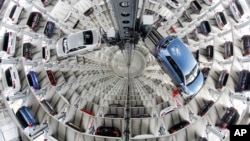Volkswagen's CEO sketched out a wide-ranging transformation of the company on Thursday that will see it focus more on electric vehicles and services like car-sharing as it seeks to get past its scandal over cheating on diesel emissions tests.
Matthias Mueller said Thursday that recalling and fixing the cars that were rigged to cheat on the tests "will remain our most important task until the very last vehicle has been put in order.''
He stressed that the company's car business remains "fundamentally sound'' but detailed a promised plan to emphasize digital services and zero-emissions vehicles. The company would soon form a legally independent company to promote business in mobility services, which can include things like ride-sharing apps and car-sharing, he said.
Mueller said that the company would "make electric cars one of Volkswagen's new hallmarks'' with 20 new models by 2020.
Volkswagen had previously emphasized diesel technology, which has suffered a blow since it became clear Volkswagen engines could not meet U.S. emissions standards without cheating. The company has admitted using engine software that disabled emissions controls when vehicles were not being tested. That improved performance and mileage but meant the vehicles spewed far more than the legal limit of pollutants.
Mueller apologized again for the scandal, telling the company's annual news conference in Wolfsburg, Germany, that "we disappointed many people who trusted Volkswagen.''
The company said last week that it made a net loss of 5.5 billion euros for 2015 after setting aside 16.2 billion euros ($18.3 billion) to cover the costs of the scandal. Analysts say the final cost will be significantly higher.
Of the set-aside for the scandal, 7.8 billion euros ($8.8 billion) was devoted to fixing or buying back diesels with the rigged software. The company is currently working out a settlement with U.S. authorities in federal court in San Francisco, and has said that would include an offer to buy back as many as 500,000 of the just under 600,000 defective vehicles.
The company said its robust cash reserves of 24.5 billion euros at year end left it in a strong financial position. Chief Financial Officer Frank Witter said that the company would not propose any capital increase to shareholders at its annual meeting in June.




